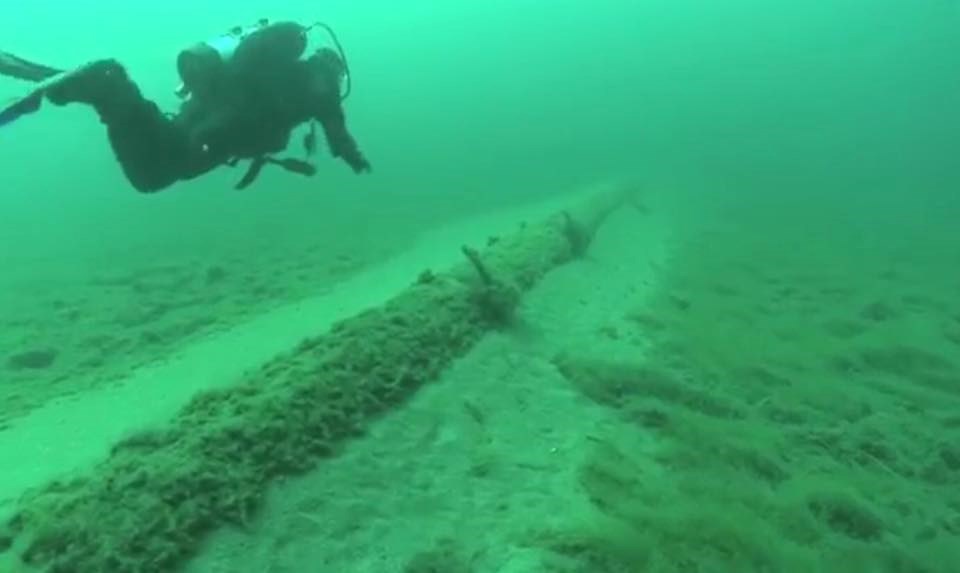A list of concerned environmental groups have written a letter to Michigan Governor Gretchen Whitmer, requesting she ensures Canadian company Enbridge stops the flow of oil through the Mackinac Straits during winter’s ice-covered conditions or when waves exceed three feet (one metre) and when winds are stronger than 18 mph (28 kph).
The groups say Whitmer should use her legal authority to protect the Great Lakes.
Enbridge Line 5 is a major oil pipeline which sends petroleum from western Canada to eastern Canada through the Great Lakes, including the environmentally sensitive Straits of Mackinac.
The group, in an email released to the media Nov. 6, drew on comments made by Admiral Paul Zukunft, United States Coast Guard (USCG) Commandant, in a 2017 U.S. Senate hearing entitled ‘Coast Guard Readiness: How Far Can We Stretch Our Nation’s Only Multi-Mission, Military Force?’
The United States Coast Guard is responsible, along with its partners, for cleanup in the event of an underwater oil spill.
“We have pipelines crossing the Lakes and I would go on the record to say the Coast Guard is not semper paratus (meaning ‘always prepared,’ the USCG’s motto) for a major pipeline oil spill in the Great Lakes,” Zukunft told the 2017 hearing, convened by U.S. Senator Dan Sullivan (an Alaska Republican), Subcommittee on Oceans, Atmosphere, Fisheries, and Coast Guard chair.
“I can’t put a dollar figure on it but we do need to make further investments in our research and development...we are paying very close attention to two anomalies when it comes to oil spill recovery; oil in an iced environment and tar sands,” Zukunft said.
Zukunft told the panel the USCG needs a major overhaul, in need of funding, new vessels and other new equipment after battling recent natural disasters that hit the U.S. mainland and territories, and as it continues with drug enforcement operations, icebreaking, safety of navigation, oil spill response, and non-maritime emergency responses.
Zukunft retired from his post as USCG Commandant in 2018.
“I’m not aware of any recent statements that support that...the Coast Guard is ready to respond to oil spills, particularly in that area (the Straits of Mackinac). We have plans in place with our partners to respond to such incidents,” said USCG Chief Petty Officer Bobby Nash, speaking to SooToday from Cleveland, Ohio.
As for fighting an oil spill in winter conditions, Nash said “the Coast Guard certainly takes into account adverse weather conditions whenever they’re responding to an incident. That would be something that would be determined by the incident commander to ensure the safety of the personnel responding.”
“It’s not just a concern for that area. Weather conditions and the safety of the responders are part of the decision making process for any incident commander across the U.S. and across the world. They certainly take that into account when they create their response plan, because each response is different.”
“But, to say we flat out can’t do it wouldn’t be truthful, it wouldn’t be accurate,” Nash said.
Notwithstanding, environmentalists fear Michigan taxpayers would be on the hook, in the event of a major Line 5 pipeline rupture on the Great Lakes, for up to $45 billion in damage repair and cleanup costs.
“This fall we have already seen waves in the Great Lakes reach 14 feet and more on several occasions,” wrote Sean McBrearty, Oil & Water Don’t Mix campaign coordinator in the environmentalist email.
“The U.S. Coast Guard’s top official has told Congress the agency is not ready for a major oil spill incident in the Great Lakes and officials have said the Coast Guard won’t even venture out to address an oil spill when waves are above three feet. Once ice conditions take over in the Straits, oil spill response becomes even more hazardous and unpredictable.”
Concerns grew greater with an early November release of a state-commissioned financial analysis that stated Enbridge’s promise of covering costs and damages from a Great Lakes oil spill are not legally binding.
The company has stated it will pay the estimated $500 million cost for a new tunnel beneath the Straits of Mackinac to contain the pipeline.
Enbridge Line 5 has operated on the floor of the Mackinac Straits without a rupture for over 60 years (the line, however, was struck by a tugboat anchor in April 2018).
Earlier, Whitmer and Michigan Attorney General Dana Nessel had attempted to completely shut down Line 5 in the area in which it crosses the Great Lakes, however Michigan Court of Claims Judge Michael J. Kelly ruled in Enbridge’s favour Nov. 1.
The court ruled the establishment of a state authority to oversee construction of the Line 5 tunnel beneath the Straits of Mackinac is constitutional.
Nessel said the state will appeal the court’s decision, Michigan news website The Center Square reported.
Groups which signed the letter to Whitmer include the Chippewa Ottawa Resource Authority, Clean Water Action, For Love of Water, Great Lakes Business Network, League of Women Voters Michigan, Mackinac Straits Alliance, Michigan League of Conservation Voters, National Wildlife Federation, Northern Michigan Environmental Action Council, Oil & Water Don’t Mix, Sierra Club, Straits Area Concerned Citizens for Peace, Justice, and the Environment, TC350 and Tip of the Mitt Watershed Council.
